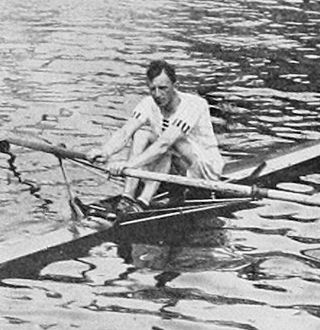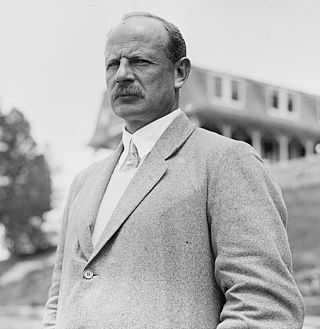Related Research Articles

Jack Beresford, CBE, born Jack Beresford-Wiszniewski, was a British rower who won five medals at five Olympic Games in succession. This record in Olympic rowing was not matched until 2000 when Sir Steve Redgrave won his sixth Olympic medal at his fifth Olympic Games.

William Duthie Kinnear was a Scottish rower who competed for Great Britain at the 1912 Summer Olympics and won major single scull events prior to the First World War.

Henry Thomas "Harry" Blackstaffe was a British rower who competed in the 1908 Summer Olympics.

Guy Nickalls was a British rower who competed in the 1908 Summer Olympics as a member of the British eight that won gold, won 22 events at Henley Royal Regatta and won the Wingfield Sculls three times.
Peter Herbert "Jacko" Jackson was an English rower who competed at the 1936 Summer Olympics.

Alexander Alcée Casamajor was a British rower who won the Wingfield Sculls in six successive years and the Diamond Challenge Sculls at Henley Royal Regatta as well as being twice in the winning Grand Challenge Cup team.

Herbert Harlee Playford was a British rower who won the Wingfield Sculls and the Diamond Challenge Sculls at Henley Royal Regatta. He was instrumental in founding London Rowing Club and the Metropolitan Regatta.
William Fawcus was a British rower and member of Tynemouth Rowing Club. He won the Wingfield Sculls and the Diamond Challenge Sculls at Henley Royal Regatta in 1871, being the first provincial competitor to do so.
Thomas Brooks Bumpsted (1822–1917) was an English surgeon and rower who won both the Diamond Challenge Sculls and Wingfield Sculls in 1844. He later died at the age of 94 in the Chesterton district.
Stephen Frost Rippingall was an English rower and cricketer who played first-class cricket for Cambridge University in 1845 and won the Diamond Challenge Sculls at Henley Royal Regatta in 1853.
Thomas Robson Bone (1815–1882) was an English rower who won the Diamond Challenge Sculls at Henley Royal Regatta in 1849 and 1850 and who also won the Wingfield Sculls in 1850 and 1851.
Gilbert Edward B Kennedy (1866–1921) was an English rower who won the Wingfield Sculls, the amateur single sculling championship of the River Thames, in 1893.
Arthur Hamilton Cloutte was an English rower who won the Wingfield Sculls, the amateur single sculling championship of the River Thames, in 1902.
Thomas Lowten Jenkins (1812–1869) was an English barrister and rower who twice won the Wingfield Sculls, the amateur championship of the River Thames.
James Paine was an English rower who competed in the 19th century and won the Wingfield Sculls and events at Henley Royal Regatta.
The Argonaut Club was an English rowing club based on the Tideway of the River Thames that competed in the middle of the 19th century.
The Thames Club was an English rowing club based on the Tideway of the River Thames that competed in the middle of the 19th century.

The St George's Club was an English rowing club based on the Tideway of the River Thames that competed in the middle of the 19th century.
James Edward Parker was an English rower who won several events at Henley Royal Regatta and won the Wingfield Sculls, the amateur sculling championship of the River Thames.
Edward Gryffydh Peacock was an English official of the East India Company, publisher, writer and rower who won the Wingfield Sculls and Diamond Challenge Sculls at Henley Royal Regatta.